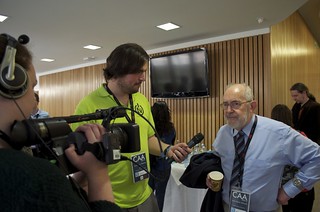CAAUK 2013 is happy to announce that we will be ‘screening’ the Personal Histories of CAA film during the conference. We are particularly looking forward to this, as it documents the experience of past CAA participants and the extent (and longevity!) of the CAA community here in the UK and beyond. The project organisers have sent through an abstract of the film and the CAA 2012 session, posted below:

John Wilcock reflects on his role in CAA (Image: CAA Conference Flickr)
This ‘Personal Histories of CAA’ film tells the story of CAA throughout the years as experienced by previous chairs and key participants.
CAA grew out of a small group of archaeologists and mathematicians interested in computer applications working in the UK in the early 1970s. The first conference was organized in Birmingham in 1973. It gradually evolved into an international event, and in 1992 it was organized outside the UK for the first time. Since then, CAA conferences have taken place in a different country each year. Since 2006 conferences are held outside Europe as well.
The 2012 edition at Southampton was the 40th anniversary of CAA. We
celebrated this event with the Personal Histories of CAA session held at the CAA conference venue on Wednesday 28 March, from 2pm to 4pm. At this celebratory session the founders, former chairs and key members of CAA throughout the last four decades shared their personal experiences with us. We were honoured that for this event we were able to welcome to Southampton Sue Laflin, Phil Barker, Clive Orton, John Wilcock, Nick Ryan, Paul Reilly and Hans Kamermans, as well as listen to an interview with Irwin Scollar. The session was moderated by the current chair of CAA, Gary Lock. The contributors discussed the advances in the field of archaeological computing fostered by the CAA as well as many personal social experiences.Over the last forty years CAA has grown from an annual event at the University of Birmingham to a national and now worldwide conference attracting over 300 participants every year. It also lived through major changes in the role computing played in academia and people’s personal lives, through the availability of computers at academic institutions, the introduction of GIS, the affordability of computers for private use, the rise of user friendly operating systems, and last but not least the emergence and extreme impact of the world wide web. These events have strongly influenced the way archaeologists have used computing and quantitative techniques, and no organisation is a better reflection of this than CAA. The Personal histories of CAA session aimed to make
the current generation of archaeologists aware of such dramatic shifts, and to provide personal perspectives for charting fascinating future research avenues.For more information about the Personal Histories project please visit the project’s website.
Tom Brughmans and Gareth Beale
Archaeological Computing Research Group, University of SouthamptonPamela-Jane Smith and the Personal Histories team
McDonald Institute for Archaeological Research, University of Cambridge
